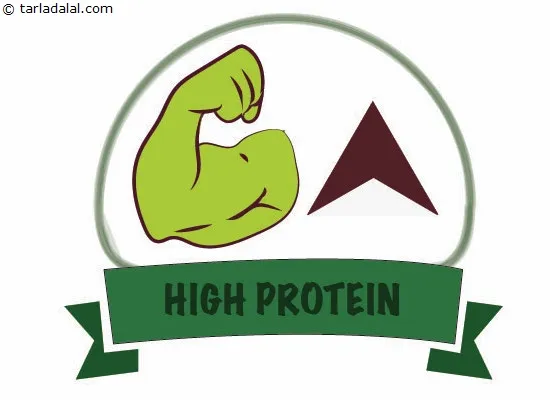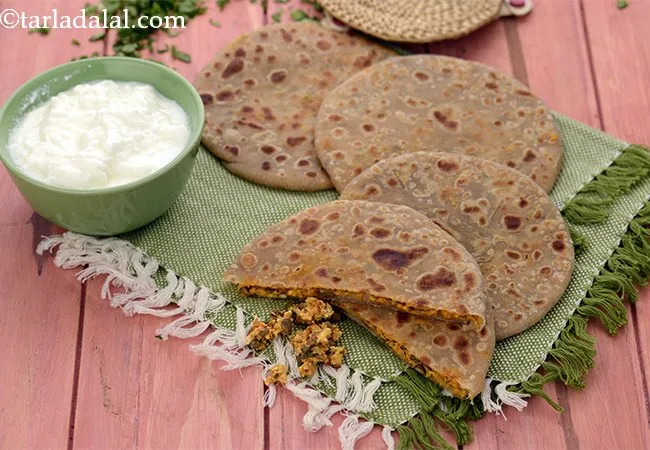masoor dal

Table of Content
What is masoor dal, split red lentil, masoor ki dal?
Masoor dal is an important part of the diet in many parts of the world, especially in the Indian subcontinent, which has a large vegetarian population. It is basically split lentil without skin and is red in colour. It does not need soaking prior to cooking as it is a soft dal and cooks quickly. When cooked, masoor dal turns a soft golden colour and has a pleasant earthy flavour. With 26 per cent protein, these lentils have the third-highest level of protein, by weight, of any plant-based food after soybeans and hemp.
How to select masoor dal, split red lentil, masoor ki dal
• Masoor dal is generally available in pre-packaged containers as well as bulk bins.
• Regardless of packaging, check the masoor dal as best as possible to ensure that they are not cracked and that they are free of debris.
Culinary Uses of masoor dal, split red lentil, masoor ki dal in Indian Cooking
Enjoy this easy masoor dal recipe made which is cooked in a pressure cooker. This Masoor dal recipe is one of the recommended foods for those undergoing dialysis.
The restricted salt content also makes this dal recipe suitable for those with high blood pressure.
Chawli leaves added to masoor dal make a pregnancy friendly chawli masoor dal recipe. Chawli is one of the richest sources of iron and vitamin A and ideal for pregnant women.
Chawli Masoor Dal is a flavourful way of adding masoor dal to your meals. It is low in fat and high in protein and will help you to gain muscles.
chawli masoor dal recipe | healthy amaranth leaves dal with lentil | Indian chaulai dal
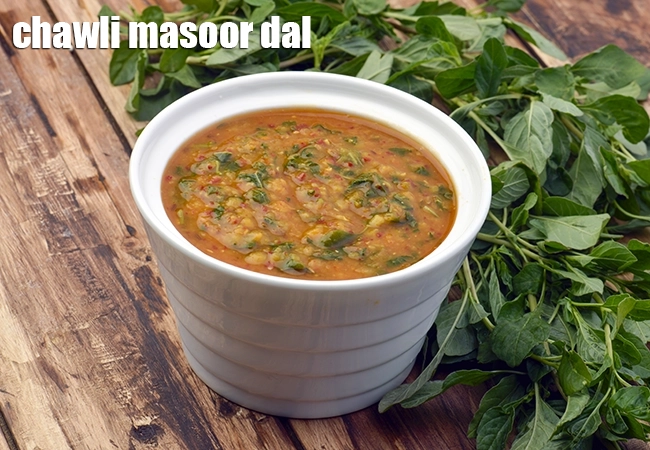
The popular dal fry recipe is made of masoor dal and yellow moong dal. With five protein-rich dals, this spicy mixed dal recipe version combines curds and traditional spices to give a tangy, spicy, delectable accompaniment for parathas and rotis.
masoor dal goes well in healthy Indian soups. This garlic masoor dal tomato soup recipe is healthy low calorie protein rich soup. Try this Bombay curry soup recipe with spinach which is powered by masoor dal and a very soothing soup when you are feeling a bug.
masoor dal and vegetable khichdi recipe | tadkewali masoor dal khichdi | Bengali masoor dal khichuri | healthy masoor dal khichdi is a one dish meal which is sure to satiate you and make up for many nutrients.
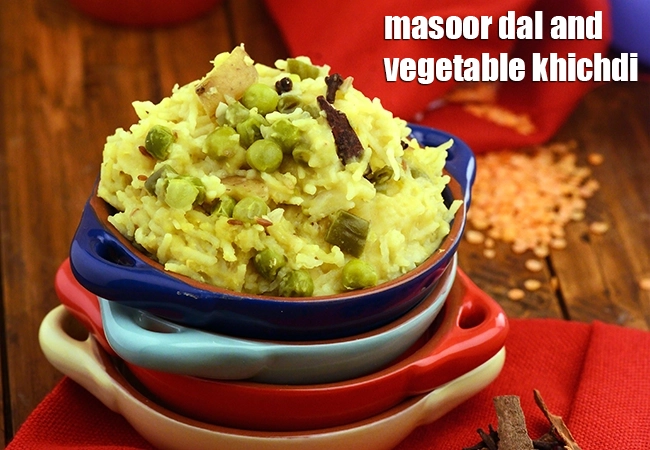
Try the East Indian version of dal – Bengali masoor dal recipe | mushurir dal | peyaj diye masoor dal
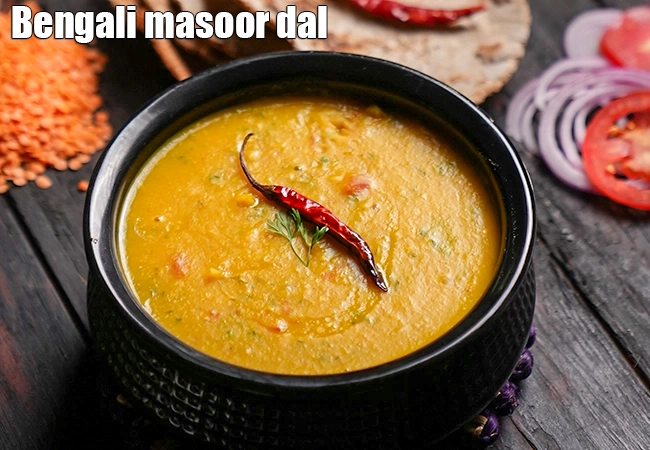
How to store masoor dal, split red lentil, masoor ki dal
• Masoor dal will keep for several months if stored in an airtight container in a cool, dry, dark place.
• If you need to store it for longer, keep in the refrigerator.
Health benefits of masoor dal, split red lentil, masoor ki dal
Masoor dal is rich in Vegetarian Protein:
Masoor dal, commonly known as red lentils, stands out as a highly valuable source of vegetarian protein, making it a cornerstone in plant-based diets across India and beyond. On average, 100 grams of cooked masoor dal can provide approximately 8-9 grams of protein, and raw masoor dal can boast up to 24-25 grams of protein per 100g, making it one of the richest plant-based protein sources among legumes. This significant protein content is crucial for various bodily functions, including muscle repair and growth, enzyme and hormone production, and overall cellular maintenance.
While many plant-based proteins are often classified as "incomplete" because they may lack one or more of the nine essential amino acids our bodies can't produce, masoor dal is relatively well-balanced in its amino acid profile compared to some other plant sources. For vegetarians, pairing masoor dal with a grain like rice or whole wheat roti creates a "complete protein" meal, ensuring the body receives all necessary essential amino acids. This makes masoor dal an incredibly versatile and economical choice for meeting protein requirements, supporting satiety, and contributing to overall health and well-being within a vegetarian diet.
1 cup of cooked Masoor dal gives 19 grams of protein which is 31% of the total daily recommendation of protein for an adult man.
Paneer Masoor Paratha is a classic example which combines 2 sources of protein – protein and masoor dal.
Masoor dal Keeps your bones and teeth healthy:
Masoor dal contains notable amounts of calcium, phosphorus, and magnesium, all of which are vital for building and maintaining strong bones and teeth. Regular consumption of these minerals helps maintain bone density, promotes healthy growth and development, and can reduce the risk of bone-related problems like osteoporosis as one ages.

masoor dal and paneer soup recipe | masoor dal soup for weight loss | healthy dal paneer soup is a delicious protein boost. Enjoy it piping hot.
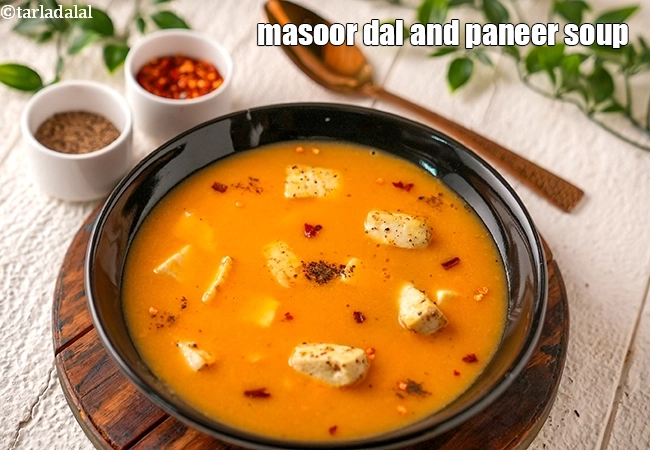
Whole Masoor and Masoor dal Aids in weight-loss:
Both whole masoor (brown/black lentils with skin) and masoor dal (split red lentils without skin) are highly beneficial for weight loss due to their exceptional nutritional profiles. They are rich in dietary fiber and protein, two key components that promote satiety. The high fiber content adds bulk to your meals, making you feel fuller for longer and reducing the likelihood of overeating or unhealthy snacking. Simultaneously, the abundant protein helps to curb appetite and preserve muscle mass during weight loss, contributing to a more effective and sustainable reduction in overall calorie intake. While whole masoor has slightly more fiber due to its intact skin, both forms offer significant benefits for managing hunger and supporting a weight-loss journey.
Click here to know more about the Health Benefits of Masoor Dal.
Nutrition Information for Masoor Dal
Nutritional Information for One cup of cooked Masoor Dal One cup of cooked Masoor Dal is 160 grams and comes from 76 grams raw Masoor Dal.
RDA stands for Recommended Daily Allowance.
260 Calories
19 grams of Protein
44.84 grams of Carbs
0.53 grams of Fat
222.68 mg of Phosphorus (P) = 37.11% of RDA (about 600 mg)
7.82 grams of Fibre = 31.28% of RDA (about 25 grams)
0.34 mg of Vitamin B1, Thiamine = 28.33% of RDA (about 1.2 to 1.5 mg
5.77 mg of Iron (Fe) = 27.47% of RDA (about 21 mg)
2.35 mg of Zinc (Zn) = 23.5% of RDA (about 10 to 12 mg)
2.20 mg of Vitamin B3, Niacin = 18.33% of RDA (about 12 mg)
56.24 mg of Magnesium (Mg) = 16.24% of RDA (about 350 mg)
27.36 mcg of Folic Acid = 13.68% of RDA (about 200 mcg)
0.14 mg of Vitamin B2, Riboflavin = 12.72% of RDA (about 1.1 mg)
439.28 mg of Potassium (K) = 9.34% of RDA (about 4,700 mg)
52.44 mg of Calcium (Ca) = 8.74% of RDA (about 600 mg)
205 mcg of Vitamin A = 4.27 % of RDA (about 4800 mcg)
5.32 mg of Sodium (Na) = 0.27% of RDA (about 1902 mg)

soaked masoor dal
First sort and inspect the masoor dal for stones, damaged lentils, etc. Then rinse thoroughly till the water runs clear. Now, soak the dal in water for 4-6 hours, and discard the water. This makes the lentil easier to cook, and also removes substances that may cause indigestion.
.webp?w=360&h=250&fit=cover&format=webp)
boiled masoor dal
As the name suggests, this refers to masoor dal that has been boiled. You can use two cups of water per cup of masoor dal and cook in a pot with the cover on. This way, it will cook a little faster, use less energy, and perhaps retain more vitamins than open cooking. A faster way is to pressure-cook the soaked masoor dal with or without salt in boiling water. Bring the concoction to a boil; then turn down the flame to medium-low. If it gets too thick, add more water. The beans are cooked when they burst and the water turns syrupy. At this point, you may add spices, vegetables or even boiled rice as per your preference and recipe requirements. Whole masoor generally take about 30 minutes in a covered pan and 5-6 minutes in a pressure cooker. Foam may form during the first few minutes of cooking, which can simply be skimmed off.
.webp?w=360&h=250&fit=cover&format=webp)
parboiled masoor dal
Parboiling is a cooking technique in which soaked masoor dal is partially cooked in boiling water, but removed before it is cooked all the way through. Many recipes call for parboiled masoor dal as it cook will then completely along with the final dish.
Related Recipes
Masoor Dal With Spinach, Protein Rich Recipes
Masoor Dal And Vegetable Khichdi
More recipes with this ingredient...
masoor dal (81 recipes), soaked masoor dal (1 recipes) , boiled masoor dal (0 recipes) , parboiled masoor dal (0 recipes)

Related Glossary
Follow US
Recipe Categories
- Vitamin B12 Cobalamin Rich 35 recipes
- Low Calorie, Weight Loss Indian 423 recipes
- Low Cholesterol Indian 315 recipes
- Healthy Indian Breakfast 374 recipes
- Indian Diabetic 565 recipes
- Indian Pregnancy 461 recipes
- Zero Oil Indian 133 recipes
- Iron Rich Indian 268 recipes
- Healthy Indian Acidity 137 recipes
- Healthy Sabzi 108 recipes
- Healthy Indian Vegetarian Snack 276 recipes
- Healthy Heart 421 recipes
- Healthy Indian Vegetarian Soups 74 recipes
- Calcium Rich Indian 373 recipes
- High Blood Pressure Indian 104 recipes
- Healthy Indian Salads 137 recipes
- Low Carb Indian Diet 163 recipes
- Hypothyroidism Diet 63 recipes
- Arthritis Diet 68 recipes
- High Protein Indian 95 recipes
- Vitamin K Diet 42 recipes
- Fatty Liver Diet 39 recipes
- PCOS 136 recipes
- Gluten Free Veg Indian 197 recipes
- High Fiber 329 recipes
- Indian Cancer Patients 275 recipes
- Jaundice Diet 45 recipes
- Sprouts 61 recipes
- Typhoid 43 recipes
- Irritable Bowel Syndrome (IBS) 23 recipes
- Kidney Stone Diet 10 recipes
- Home Remedies 213 recipes
- Senior Citizen 195 recipes
- Healthy Indian Drinks and Juices 214 recipes
- Diet for Dialysis 10 recipes
- Gout Indian Recipes 17 recipes
- Potassium Rich 80 recipes
- Vegan 195 recipes
- Indian recipes to treat Vomiting 8 recipes
- Forever Young Diet, Anti Aging Indian Diet 255 recipes
- Antioxidant Rich Indian 445 recipes
- Vitamin B1 Rich Indian Foods, Recipes 101 recipes
- High in Omega 3 Fatty Acids 32 recipes
- Zinc Rich Foods 55 recipes
- Vitamin A Rich, Beta Carotene, Retinol 89 recipes
- Malaria Diet 19 recipes
- Magnesium Rich 94 recipes
- Vitamin C Rich Indian recipes 118 recipes
- Healthy Indian Dinner 85 recipes
- Low Veg Glycemic Index 86 recipes
- Lower Blood Pressure Salads 8 recipes
- Healthy Indian Lunch Recipes 29 recipes
- Lactation 25 recipes
- Vitamin E Rich 51 recipes
- Hyperthyroidism Diet 47 recipes
- Vitamin B3, Niacin Rich 41 recipes
- Post Surgery Diet 42 recipes
- Selenium 27 recipes
- Phosphorus Rich Indian Recipes, Foods 74 recipes
- Lower Blood Pressure Desserts Sweets 14 recipes
- Copper 15 recipes
- Foods Rich in Vitamin B2 Riboflavin 22 recipes
- Vitamin B6 Diet 36 recipes
- B Vitamins 231 recipes
- Vitamin B9 Rich Folate 50 recipes
- Marathoners, Endurance Athletes, Triathlete 225 recipes
- Manganese Diet 32 recipes
- Thalassemia 18 recipes
- Detox Water, Fruit Infused Water 42 recipes
- Lactose Free Dairy Free 22 recipes
- Omega 6 Fatty Acids 32 recipes
- Phytonutrients 51 recipes
- Chronic Kidney Disease Indian recipes 12 recipes
- Selenium1 0 recipes
- Quick Indian Snacks / Quick Starters 385 recipes
- Quick Breakfast Indian 131 recipes
- Quick & Easy Indian Sabzi 117 recipes
- Quick Rotis and Parathas 46 recipes
- Quick Indian Sweets 139 recipes
- Quick Stir-Fries 51 recipes
- Quick Vegetarian Indian Soups 72 recipes
- Quick Chutneys 67 recipes
- Quick Vegetarian Rice, khichdi Recipes 56 recipes
- Indian Snacks Under 10 Minutes (Quick Veg Recipes) 44 recipes
- Quick Indian Dips, Gravies & Sauces 105 recipes
- Quick Veg Indian Pizza 17 recipes
- Quick Veg Pasta 25 recipes
- Quick Pickles / Aachar 25 recipes
- Quick Dals / quick Kadhis 29 recipes
- Snacks under 5 minutes 33 recipes
- Quick Healthy Recipes 43 recipes
- Quick Pressure Cooker 46 recipes
- Quick Desserts 48 recipes
- Quick 3 Ingredients 63 recipes
- Quick Indian Desserts 21 recipes
- Quick 4 Ingredients 41 recipes
- Quick 5 Ingredients 42 recipes
- Kids Tiffin Box 319 recipes
- Recipes for Toddlers (1-3 Years) 32 recipes
- Sweet Recipes for Kids 456 recipes
- Recipes for Baby (10 to 12 Months) 17 recipes
- Quick Indian recipes for Kids 72 recipes
- Indian Breakfast Recipes for Kids 194 recipes
- Recipes for Weaning (8 to 9 months) 22 recipes
- Snack Recipes for Kids 620 recipes
- Healthy Foods for Kids 196 recipes
- Recipes Kids can make 36 recipes
- Kids After School 794 recipes
- Kids Jar Snacks 67 recipes
- Finger Foods for Babies, Toddlers and Kids 76 recipes
- Kids Weight Gain 43 recipes
- Kids Wraps and Rolls 23 recipes
- Kids Veg Pasta 27 recipes
- Kids Brain Boosting 68 recipes
- Protein rich food for kids 71 recipes
- Recipes for Weaning 15 recipes
- Kids Pizzas 30 recipes
- Babies, Toddler and Kids Iron Rich Foods 31 recipes
- Kids High Energy Indian Foods 103 recipes
- High Fiber Foods for Kids 40 recipes
- Kids Noodles 37 recipes
- Kids Calcium Rich Indian recipes 92 recipes
- Babies recipes, 6 to 18 months 34 recipes
- Kids Recipes for Increasing Immunity 10 recipes
- Kids Weight Loss 58 recipes
- Teething Recipes for Babies 10 recipes
- Cereals and Pulses for 8 to 9 months Baby 8 recipes
- Weaning foods at 7 months 12 recipes
- Indian Teen 315 recipes
- Starters / Snacks 2139 recipes
- Indian Breakfast 820 recipes
- Main Course Recipes 929 recipes
- Indian Salads 385 recipes
- Indian Desserts , Sweets 985 recipes
- Indian Soups 249 recipes
- Indian Drinks (Chai, Lassi & More) 484 recipes
- Indian Dinner 903 recipes
- Indian Dinner1 0 recipes
- Indian Lunch (Lunch Box & Quick Meals) 829 recipes
- Side Dishes 449 recipes
- Indian Travel Food 433 recipes
- Indian Barbeque1 recipes 22 recipes
- Frozen Foods, Indian Freezer Recipes 67 recipes
- Whole Wheat Recipes 56 recipes
- Indian Comfort Foods 212 recipes
- Dinner Menus 56 recipes
- Easy Indian Veg 70 recipes
- Innovative Indian Recipes 27 recipes
- No Cook Indian 37 recipes
- Advanced Recipes 10 recipes
- Cakes with Eggs 13 recipes
- Microwave 229 recipes
- Oven 619 recipes
- Indian Steamer Recipes 102 recipes
- Kadai Veg 407 recipes
- Indian Barbeque Recipes 43 recipes
- Sizzler tray 15 recipes
- Mixer 566 recipes
- Pressure Cooker 315 recipes
- Tava 646 recipes
- Non-stick Pan 1393 recipes
- Indian Freezer recipes, meals 57 recipes
- Appe Mould 18 recipes
- Pan 223 recipes
- Non Stick Kadai Veg 203 recipes
- kadai Indian 150 recipes
- Refrigerator 176 recipes
- Waffle Indian recipes 6 recipes
- Handi 12 recipes
- Juicer and Hopper 65 recipes
- Grill 31 recipes
- Toaster 21 recipes
- Gas Toaster 8 recipes
- Healthy Indian steamed 73 recipes
- No Cooking Veg Indian 335 recipes
- Vegetarian baked Indian recipes 381 recipes
- Boiled Indian recipes 129 recipes
- Deep Fry 261 recipes
- Indian Tawa 265 recipes
- Shallow Fry Indian 25 recipes
- Microwave1 172 recipes
- Saute 273 recipes
- Indian Pressure Cooker 171 recipes
- Stir-fry 101 recipes
- Roasting 0 recipes
